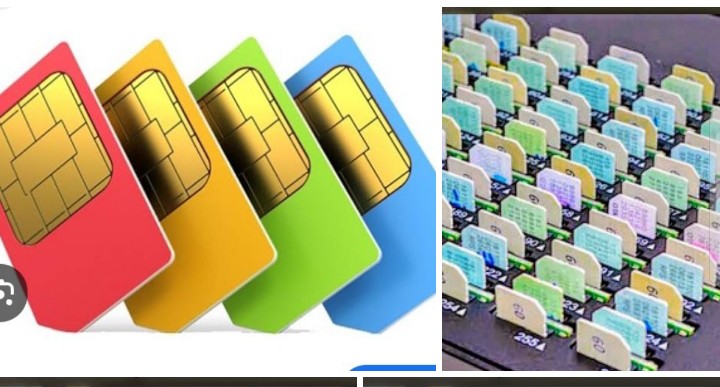By Suleiman Bala Bakori
===============

Boxes have a multitude of uses, and the word “box”, lends itself to diverse contexts. For “Ajala Travelers,” the box is a necessity for keeping goods for their endless journeys. In literature, idiomatically, it can be said that “one has been boxed into a corner;” another might say to deal with a conundrum: “think outside the box;” then there is the “Pandora’s box” that no one wants opened. To “box one’s ear’s” refers to a hit on the head, especially around one’s ears. For those who celebrate Christmas, “Boxing Day,” which is the 26th of December, the second day of Christmastide is not to be joked with: A day to unbox gifts. So much for the box.
Another type of boxes exists in the telecommunications world: The SIM Box. Have you ever received an international call but saw a local phone number ring in? That is SIM Boxing in action. Let me explain.
SIM boxing happens when a person uses a special equipment, what is called a SIM Box containing tens to hundreds of SIM Cards—from 32, to 96, to 512 and more SIMs —to terminate international calls by bringing in the international call into the SIM Box using internet connections and regenerating the calls to the called party from one of the hundred SIMs in the box. This way, the called party will see the local number of the SIM from the SIM Box, and not the original international number calling.
With SIM Boxes, the syndicate charges international call carriers lower rates than what regular Nigerian telecommunications operators would charge, as they do not have to pay the full cost of maintaining and operating a phone network. Basically, they are bypassing the normal route for international phone call termination to terminate international calls cheaply and making windfall profits off it.
Take for instance, a telecommunications operator in Nigeria would ordinarily charge international carriers 10cents per minute for terminating an international call in Nigeria. However, by routing the call through a SIM Boxing syndicate, the international telecommunications carrier only pays a fraction of the charge to the syndicate, say 5cents per minute and does not have to pay the full 10cents per minute charge.
The SIM Boxer will terminate this call to the called subscriber at a rate of, say N15 per minute using one of the SIM cards in their SIM Box. The SIM Boxer thus makes a killing from the differential between the rate charged to the international carrier and the rate paid to telecommunications operators whose SIM they utilise in their SIM Boxes, at the expense of our national security and income of mobile network operators and quality of our service to consumers.
Asides the revenue loss that local mobile network operators suffer courtesy the activities of these syndicates, networks face congestion around areas where the illegal call routings via SIM Boxing occurs. With the huge traffic from the boxes, callers around the area see more dropped calls, poor call quality, and slower data speeds.
The introduction of the linking of National Identity Numbers (NIN) to SIMs is one way the Federal Government has worked to tackle this criminal enterprise. With every SIM in the country being linked to an NIN, an identity is tied to the owner of each line, and regulators now have visibility of ownership. That is not all. There is also the “Max-4 Rule” where a subscriber is not allowed to have more than four lines per network operator linked to his NIN. With this rule in place, coupled with the NIN-SIM Linkage, every telephone subscriber in Nigeria would not just be accurately identifiable but limited to having only four telephone lines per subscriber.
To enforce this rule, the Nigerian Communications Commission (NCC) on the 29th of March 2024 announced the deadline for Mobile Network Operators to bar all subscribers who had five lines and above, and whose NIN failed the verification test of biometrics matching.
Over the last few weeks, sources within the NCC have confirmed cases where a single NIN was linked to over 100,000 lines. Some NINs had well over 10,000 SIMS linked to them, others over a thousand, others had hundreds. Many have questioned the reports and asked, what would any single reasonable person be doing with these number of lines? Justifiable questions, because no sane person—who is not running a business—should own more than five SIM cards.
Given the ‘Max 4 Rule’ in place and the NIN-SIM Linkage Policy, SIM Boxers have been boxed into a corner. The applications they use require tens to thousands of SIM Cards, and the imperative to stay anonymous. If these policies are well and fully implemented, this is the death knell for SIM Boxing merchants.
But the regulator, NCC needs to be fast and ready for the battle ahead. SIM Boxing is a billion-dollar criminal enterprise. They are not going to go down without a fight. It is like taking a bone being chewed from the mouth of a bulldog.
Already, the battle seems to have kicked off. A lawyer, Barrister Olukoya Ogunbeje has recently taken the Federal Government, NCC and Mobile Network Operators to court, claiming that the barring of SIMs not linked to NINs goes against his fundamental human rights, and has cost him the loss of business opportunities. Anyone who has Nigeria’s interest at heart ordinarily supports this policy. It then does not add up seeing a so-called activist lawyer take up such a matter that is clearly against the public interest—unless this is the Haka cry of SIM Boxers.
A most interesting observation with his case is that it is not even a class action, but individually driven. It begs the question then, who is funding Barr. Olukoya Ogungbeje? What is his interest in fighting this policy that puts paid to the business of a criminal enterprise? Is he funded by interests in the SIM Boxing world? Time would tell. But in the meantime, NCC must go head on without fear or intimation and clean the Augean stable of SIM ownership in Nigeria.
Suleiman Bala Bakori is a researcher, and writes from the FCT.
(First Published on Premium Times)









